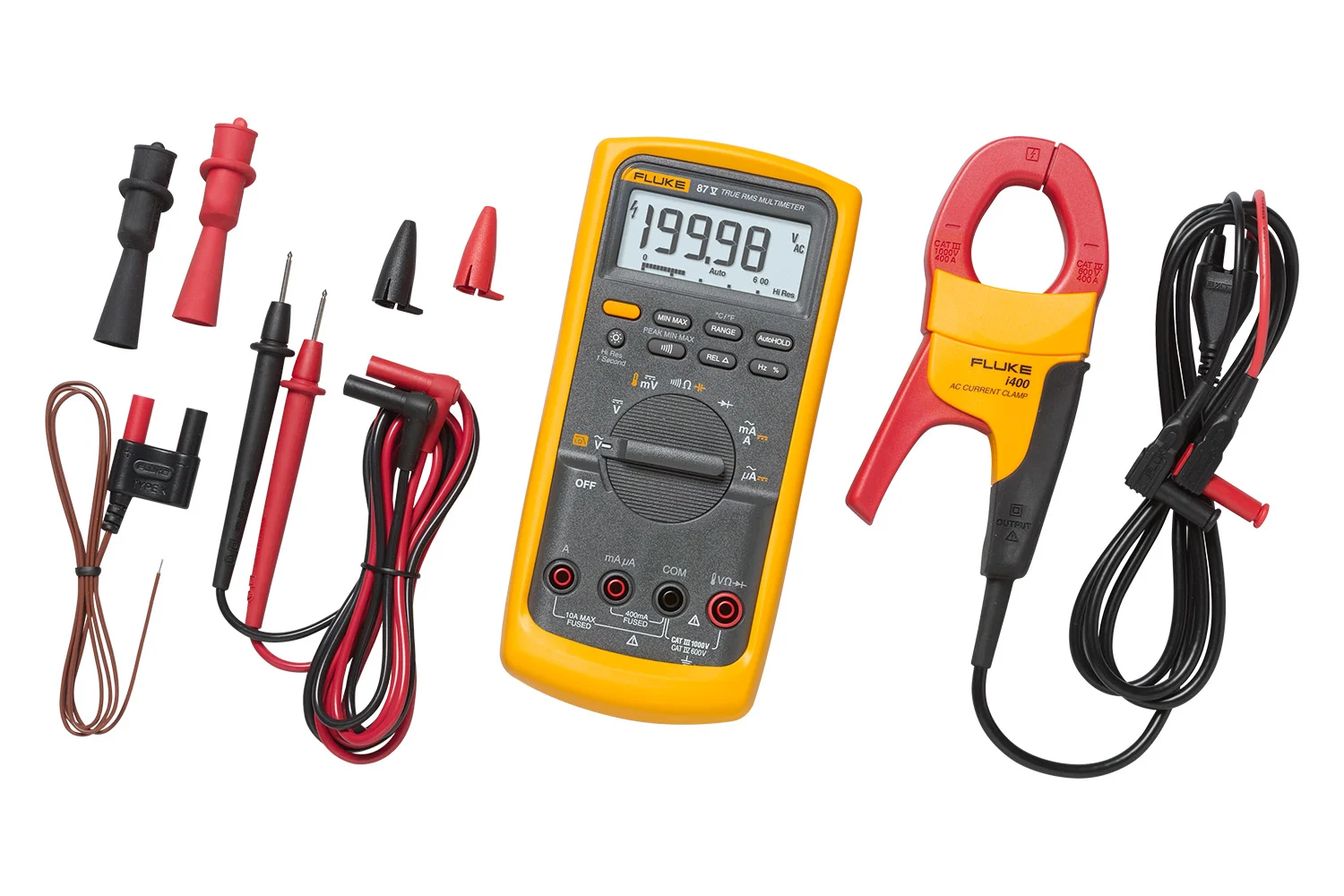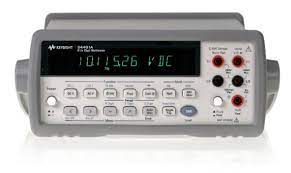Handheld vs. Benchtop Multimeters
The Definitive Guide To Using Multimeters
Handheld vs. Benchtop Multimeters
There are two primary constructions of multimeters, handheld and benchtop multimeters. While handheld multimeters are extremely portable and offer the ultimate in convenience, benchtop multimeters are often far more accurate and provide many additional features and functionality.
Outside of making the decision to choose an analog or digital multimeter, the next most important decision is to choose between benchtop and handheld multimeters.
There is no doubt that handheld multimeters are far more common than benchtop multimeters. Given that the multimeter is something of the general workhorse of all electrical measurements, it makes sense that the more portable option would be more popular.
However, there are plenty of scenarios where you will need a far more specialized piece of equipment - for example when extremely accurate measurements are necessary. That is where the benchtop multimeter comes into play.
the Definitive Guide to Using Multimeters
This is the 7th article in our series, The Definitive Guide to Using Multimeters.
This article delves into the comparison between benchtop and handheld multimeters, outlining their features, benefits, and applications to help you make an informed decision.
In This Article
If you missed the start of the series: What Is a Multimeter: The Definitive Guide to Multimeters, check it out now! You will be able to work your way back to this article quite quickly.
The Definitive Guide to Multimeters
- What is a Multimeter?
- Why Are Multimeters Important?
- What Do Multimeters Measure?
- What is the History of the Multimeter?
- What are the Common Types of Multimeters?
- What are Common Multimeter Options?
- What are Some Multimeter Specifications?
- What are Common Uses of Multimeters?
- How Do I Choose the Best Multimeter For The Job?
- How Do I Use a Multimeter?
- How Do I Properly Maintain a Multimeter?
- How Do I Calibrate a Multimeter?
- What is the Future of Multimeters?
- Multimeter FAQs
What are Handheld Multimeters?
Handheld multimeters are portable electric measurement devices designed to be held and operated with a single hand. They are compact, lightweight, and battery-powered, making them highly convenient for on-the-go measurements. Despite their smaller size, handheld multimeters offer a wide range of features and capabilities.
Most electrical measurement applications are going be done in the "field", whether that be at a job site or on a machine on a factory floor. As a result, the handheld multimeter is a far more common instrument.
Handheld multimeters are intended for use in the field. Their primary focus is on portability, so the user can quickly and easily make basic voltage, current and resistance measurements on the fly.
Simply put, the types of measurements done in the field are commonly not complex. As a result, things like accuracy and advanced features are commonly less important.

Fluke 87V Handheld Multimeter & Accessories (Image Source: Fluke Corporation)
Advantages of Handheld Multimeters
There are several relative advantages to selecting a handheld multimeter over a benchtop multimeter:
- Portability
- Cost
- Size
Portability
Handheld multimeters are more portable for on-site measurements.
Cost
Most handheld multimeters have a lower cost compared to benchtop models
Size
Typically, handheld multimeters are the ideal for basic electronic tasks.
Things to Consider Before Buying a Handheld Multimeter
Before opting to buy a handheld multimeter, it is essential to consider the following factors:
- Accuracy and Precision
- Display Size
- Safety Features
Accuracy and Precision
Handheld multimeters generally provide sufficient accuracy for most applications. However, if high-precision measurements are crucial for your work, a benchtop multimeter may be a better choice.
Display Size
Due to their compact nature, handheld multimeters typically have smaller displays compared to benchtop models. Ensure the display is large enough for comfortable reading, especially in dimly lit environments.
Safety Features
Depending on your specific requirements, check if the handheld multimeter offers features like overload protection, fused current inputs, and CAT safety ratings to ensure safe measurements in hazardous conditions.
For a more in-depth discussion, please see ....
What are Benchtop Multimeters?
Benchtop multimeters, also known as desktop or laboratory multimeters, are larger, stationary devices designed for more demanding applications. They offer enhanced precision, accuracy, and a broader range of measurement options compared to their handheld counterparts. Benchtop multimeters are typically powered through an AC power source, providing stable and reliable performance.
In more advanced fields, it is often that the need for high levels of accuracy comes up - especially when working with extremely low currents and voltages.
This is an environment where benchtop multimeters are very common. Some benchtop multimeters can even measure out to 8.5 digits, compared to 3.5 or 4.5 digits for handheld multimeters.
Most benchtop multimeters are quite larger than handheld multimeters. Typically they spend their lives stationed on an engineer's desk or mounted in a testing rack. Oftentimes a benchtop multimeter will be used in settings where automated testing is required.

Keysight 34401A Benchtop Multimeter (Image Source: Fluke Corporation)
Advantages of Benchtop Multimeters
There are several relative advantages to selecting a benchtop multimeter over its handheld counterpart:
- Accuracy
- Enhanced Features
- Automation
- Display Size
Accuracy
Benchtop multimeters have higher accuracy in measurements. It is not unheard of to have benchtop multimeters that can measure out 8.5 digits.
Enhanced Features
Greater functionality and measurement options. There is almost no limit to what a benchtop multimeter can measure. Additionally, you will get far more data recording options.
Automation
Benchtop multimeters offer the capability to automate the measurement process for all standard units via remote control and data recording.
Display Size
Most multimeters typically have much larger displays for easy reading, in addition to the data output options that exist.
Things to Consider Before Buying a Handheld Multimeter
Before investing in a benchtop multimeter, consider the following aspects:
- Cost
- Space and Portability
- Learning Curve
Cost
Benchtop multimeters tend to be more expensive compared to handheld models, especially when higher accuracy and additional features are required. Assess your budget and requirements accordingly.
Space and Portability
Benchtop multimeters require a dedicated workspace and power source. If portability is a priority or space is limited, a handheld multimeter might be a more practical choice.
Learning Curve
Benchtop multimeters often have more complex interfaces and advanced features, which may require a learning curve to fully utilize their capabilities. Ensure you have the necessary expertise or training to make the most of the instrument.
What's Next: The Definitive Guide to Multimeters
As far as multimeter construction goes, we have now covered the two most common distinctions: analog vs. digital display and handheld vs. benchtop multimeters.
In the next section, we will dive into one of the most prevalent types of multimeters, True-RMS multimeters, how they operate and why they are important. Lets get started and head to Section 8: True-RMS Multimeters.
ISO/IEC 17025 Accredited Multimeter Calibration
Fox Valley Metrology proudly offers accredited precision measuring instrument calibration services of Multimeters. We calibrate all types of Multimeters at our offices throughout the country, meaning we are sure to have local Multimeter calibration services near you.
- ✓ ISO 17025 accredited calibration vendor
- ✓ Broadest calibration scope in the industry
- ✓ 3-5 day turnaround time for laboratory calibrations
- ✓ Pickup and delivery service options available
- ✓ Onsite calibrating service options